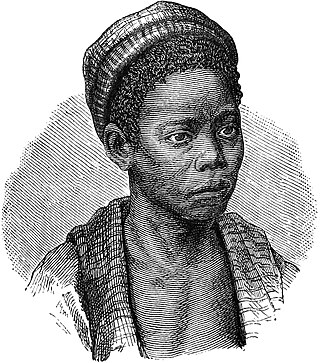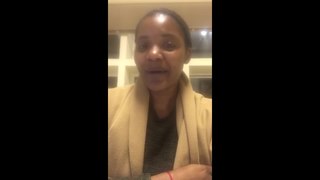
Botswana, officially the Republic of Botswana, is a landlocked country in Southern Africa. Botswana is topographically flat, with approximately 70 percent of its territory being the Kalahari Desert. It is bordered by South Africa to the south and southeast, Namibia to the west and north, Zambia to the north and Zimbabwe to the northeast. Being a country of slightly over 2.4 million people, and roughly the size of France, Botswana is one of the most sparsely populated countries in the world. It is essentially the nation state of the Tswana people, who make up 79% of the population.
The history of Botswana encompasses the region's ancient and tribal history, its colonisation as the Bechuanaland Protectorate, and the present-day Republic of Botswana. The first modern humans to inhabit Botswana were the San people, and agriculture first developed approximately 2,300 years ago. The first Bantu peoples arrived c. 200 CE, and the first Tswana people arrived about 200 years later. The Tswana people split into various tribes over the following thousand years as migrations within the region continued, culminating in the Difaqane in the late 18th century. European contact first occurred in 1816, which led to the Christianization of the region.

Tswana, also known by its native name Setswana, and previously spelled Sechuana in English, is a Bantu language spoken in and indigenous to Southern Africa by about 8.2 million people. It is closely related to the Northern Sotho and Southern Sotho languages, as well as the Kgalagadi language and the Lozi language.

Mahikeng, formerly known as Mafikeng and alternatively known as Mafeking, is the capital city of the North West province of South Africa.

The Tswana are a Bantu ethnic group native to Southern Africa. Ethnic Tswana made up approximately 85% of the population of Botswana in 2011.
The term Batlôkwa refers to several Kgatla[(setswana tribe)] communities that reside in Lesotho and South Africa.

The Bechuanaland Protectorate was a protectorate established on 31 March 1885 in Southern Africa by the United Kingdom. It became the Republic of Botswana on 30 September 1966.

North West is a province of South Africa. Its capital is Mahikeng. The province is located to the west of the major population centre and province of Gauteng and south of Botswana.

Lozi, also known as siLozi and Rozi, is a Bantu language of the Niger–Congo language family within the Sotho–Tswana branch of Zone S (S.30), that is spoken by the Lozi people, primarily in southwestern Zambia and in surrounding countries. This language is most closely related to Northern Sotho, Tswana (Setswana), Kgalagari (SheKgalagari) and Sotho. Lozi, sometimes written as Rotse, and its dialects are spoken and understood by approximately six per cent of the population of Zambia. Silozi is the endonym as defined by the United Nations. Lozi is the exonym.

Badimo or is the name for the traditional African practice of ancestor veneration for the Sotho-Tswana people of Botswana, Lesotho and South Africa. Although most Sotho-Tswana people are Christians, in reality a great majority of them follow at least some of the traditions deemed Badimo even if they are strong followers of another religion as well.

Besides referring to the language of the dominant people groups in Botswana, Setswana is the adjective used to describe the rich cultural traditions of the Batswana - whether construed as members of the Setswana ethnic groups or of all citizens of Botswana. the Batswana believe in the rich culture of Botho-Ubuntu, ‘‘People are not individuals, living in a state of independence, but part of a community, living in relationships and interdependence.’ Batswana believe in working together and in being united.

The Sotho-Tswana, also known as the Sotho or Basotho, although the term is now closely associated with the Southern Sotho peoples are a meta-ethnicity of Southern Africa. They are a large and diverse group of people who speak Sotho-Tswana languages. The group is predominantly found in Botswana, Lesotho, South Africa, and the western part of Zambia. Smaller groups can also be found in Namibia and Zimbabwe.

The following outline is provided as an overview of and topical guide to Botswana:

The population of Botswana is divided into ethnic Tswana and other tribes. the ethnic Tswana is split up among eight tribes: Bangwato, Bakwena, Bangwaketse, Bakgatla, Barolong,Batlokwa,Balete and Batawana. Other tribes speaks own tribal languages and Setswana as a second language constitute the non-Tswana people,that is Bakgalagadi consisting of numerous sub-groups of Babolongwe, Bangologa, Bashaga, Bakgwatheng,etc. The tribe is spread through more than half of the country and are found in Kweneng West, Ngwaketse West, Kgalagadi South, Kgalagadi North, Ghanzi District, North West District and parts of the Central District. Other tribes are Batswapong, Babirwa, BaKalanga,Ovaherero,Veekuhane,etc. Reliable statistics is not available but postulations are ethnic tswana 45%, Bakgalagadi 35% Kalanga people (18%), and Basarwa (2%). The remaining 7% consist of other peoples, including some speaking the Kgalagadi language, and 1% of non-African people.
Kgalagadi is a Bantu language spoken in Botswana, along the South African border. It is spoken by about 40,000 people. In the language, it is known as Shekgalagari.
The Mbanderu are a population inhabiting eastern parts of Namibia and western parts of Botswana. They speak Otjiherero, a Bantu language.
Masego is a Tswana/Pedi name meaning blessings that may refer to:
Kagiso or Kagisho is a Tswana given name. It means "peace" In the English language. Some people called Kagiso include
The Kgalagadi, or Bakgalagadi, are a Sotho-Tswana ethnic group native to Botswana. They are a section of the Batswana people. The name "Bakgalagadi" means "people of the Kalahari", and the group is thought to have migrated into Botswana from the Transvaal region of South Africa in the 17th century.








